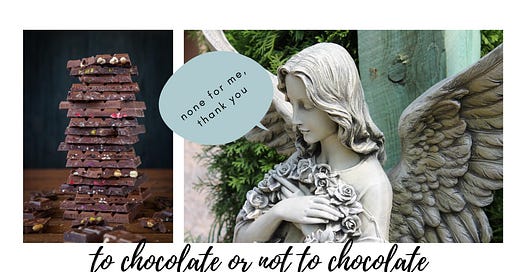When I die I would like to be buried with a jar of chocolate. Like a Mayan emperor.
Actually I don’t really mean that. I think the request would freak out my entire family.
I just wanted to make you think about how much you value chocolate in your life.
Because it’s somehow undervalued.
Either we angelically abstain from indulging in it, or we eat a whole bar and feel GREAT while we do it, followed by feeling guilty and sick.

This week I’m going to tell you why that needs to stop.
Eating (dark) chocolate is better than not eating chocolate. It’s also better than eating white or milk chocolate.
In fact, research shows that eating moderate amounts of dark chocolate is linked with:
better memory
improved attention span, reaction time, and problem-solving skills
reduced depressive mood (no kidding)
increased blood flow to the brain
improved ability to see in low contrast lighting conditions
reduced blood pressure
improved blood sugar regulation (= less mood swings)
reduced risk of cardiovascular disease (yes, that’s heart attacks and co.)
Have a look at the references section below if you want to understand the mechanisms by which dark chocolate might have these effects. In short, it’s mostly to do with their high content of flavonoid anti-oxidants and magnesium.
Conclusion? Eat chocolate (maybe daily).
Which brings me to this week’s #1M4YH challenge: get into the routine of having one or two pieces of good quality (hopefully organic) dark chocolate (85% cocoa or more) as your post-dinner dessert.
The benefits will be:
a) all the healthy stuff I listed above
b) you will feel more satisfied after dinner because you've had dessert (a.k.a. none of that pesky post-dinner late-night snacking that’s so bad for our gut bugs - more about that in a future email)
c) you will be less likely to binge on a whole bar of poor quality chocolate and feel guilty about it later, because you will know the good stuff is there for you at home 😉
Share your after-dinner chocolate pictures with me on Instagram and Facebook! Tag me @efias_kitchen on Insta and @insideefiaskitchen on Facebook.
Remember to use the hashtag #1M4YH so I can see what you’re up to.

P.s. The only time I would say don’t eat dark chocolate (regularly or in large amounts) is if you suffer from Histamine Intolerance. You can read more about that here.
You can support this newsletter by sharing it with your friends or on social media using the button below.
If you’re new here and you loved this email then please subscribe by clicking the button below.

Links and References:
Zimmermann, B.F. and Ellinger, S., 2020. Cocoa, chocolate, and human health.
Mostofsky, E., Johansen, M.B., Tjønneland, A., Chahal, H.S., Mittleman, M.A. and Overvad, K., 2017. Chocolate intake and risk of clinically apparent atrial fibrillation: the Danish Diet, Cancer, and Health Study. Heart, 103(15), pp.1163-1167.
Veronese, N., Demurtas, J., Celotto, S., Caruso, M.G., Maggi, S., Bolzetta, F., Firth, J., Smith, L., Schofield, P., Koyanagi, A. and Yang, L., 2019. Is chocolate consumption associated with health outcomes? An umbrella review of systematic reviews and meta-analyses. Clinical Nutrition, 38(3), pp.1101-1108.
Serafini, M. and Jirillo, E., 2017. Chocolate and health: friend or foe?. Frontiers in Nutrition, 4, p.67.
Steinberg, F.M., Bearden, M.M. and Keen, C.L., 2003. Cocoa and chocolate flavonoids: implications for cardiovascular health. Journal of the American dietetic association, 103(2), pp.215-223.
Messerli, F.H., Sarmadi, B., Aminuddin, F., Hamid, M., Saari, N., Abdul-Hamid, A. and Ismail, A., 2012. Chocolate and Your Health. N Engl J Med, 367(16), pp.1562-4.
Images from www.canva.com
Learn more about me at www.efiaskitchen.com



